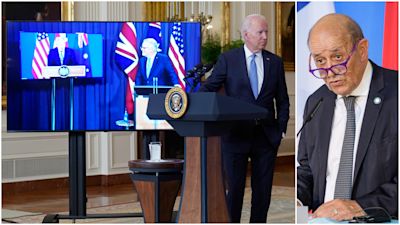'We've been stabbed in the back': France attacks UK, US and Australia defence deal

Leaders spoke in vague terms about tension in the Indo Pacific, but China believes this is an attempt to push back against it, ITV News Global Security Editor Rohit Kachroo reports
France claims it has been "stabbed in the back" over a new defence deal dubbed Aukus, which was agreed between the UK, US and Australia.
The deal, which will see Britain and America help Australia acquire nuclear-powered submarines, has also been criticised by China for a “Cold War mentality" from which it suggests the idea was born.
Prime Minister Boris Johnson, US President Joe Biden and Australian Prime Minister Scott Morrison, held a televised press conference on Wednesday night, saying the deal will help "sustain peace and stability in the Indo-Pacific region".
But France has hit out at the alliance, saying Australia has "betrayed" its trust by backing out of a previous submarine deal with the European nation in order to sign the new agreement.
There is a possibility that the US capability to retain its focus on China could be disrupted by future events in Afghanistan, Global Security Editor Rohit Kachroo comments
Australia had agreed in 2016 that France would help to build 12 conventional submarines but following the deal with America and Britain, it notified France that it would end the contract.
French Foreign Minister Jean-Yves Le Drian, in an interview with France Info, said he was "angry" that Australia had reneged on the deal.
He said: "It is really a stab in the back. We built a relationship of trust with Australia, and this trust was betrayed and I'm angry today, with a lot of bitterness, about this breach (of contract).
"This is not done between allies, especially when there's been two years of negotiations for this contract."
Prime Minister Johnson insisted the UK's military relationship with France remains "rock solid", despite the foreign minister's comments.
Asked by Keir Starmer in the Commons about how the new Aukus alliance would affect relations with France, Mr Johnson said: "This government's commitment to Nato is absolutely unshakeable and indeed has been strengthened by the massive commitments we have made, the biggest uplift in defence spending since the Cold War."
Announcing the security deal, Biden said the alliance will ensure a 'free and open Indo-Pacific' to build a 'future of peace, opportunity for all the people in the region':
He said: "Our relationship with France, our military relationship with France, again, Mr Speaker, is rock solid.
"And we stand shoulder-to-shoulder with the French, whether in the Sahel where we are running a joint operation against terrorists in Mali, or whether in Estonia where we currently we have the largest Nato operation."
China labelled the new defense deal an "irresponsible act" and raised questions about Australia's commitment to the non-proliferation of nuclear weapons.
Zhao Lijian, a spokesperson of China's Ministry of Foreign Affairs, said during a daily news conference that the cooperation "severely damages regional peace and stability, intensifies the arms race, and jeopardises the international efforts in promoting the non-proliferation of nuclear weapons."
Dr Henry Wang, president of non-government think tank the Centre for China and Globalisation (CCG), has said the Aukus alliance is part of a “Cold War mentality by the UK and its allies”.
On BBC Radio 4’s Today programme Dr Wang said: “I don’t think this is necessarily the right time to do this military alliance. It’s called security but if it’s not aimed at China why do they propose it at this time and in this region.
“I think there’s a question over the purpose of setting up such an alliance in peacetime in the 21st century.”
According to reports, the attempt to secure allied nuclear submarines in the Pacific is seen as a tool to "contain Chinese military expansion".
The UK's Ministry of Defence said the Asia-Pacific region is "on the frontline of new security challenges", troubled by territorial disputes, nuclear proliferation and miscalculation, climate change, terrorism and serious organised crime.
"I'd like to thank that fella down under..." - Biden appears to forget Australian PM Scott Morrison's name during the 'Aukus' announcement:
The allies say they will spend 18 months designing and building the nuclear submarines for the Royal Australian Navy.
There has been no date set for when the submarines will begin operating, but leaders say they hope it can be achieved "at the earliest achievable date".
Prime Minister Boris Johnson said: "The UK, Australia and US are natural allies – while we may be separated geographically, our interests and values are shared. The AUKUS alliance will bring us closer than ever, creating a new defence partnership and driving jobs and prosperity.
"This partnership will become increasingly vital for defending our interests in the Indo-Pacific region and, by extension, protecting our people back at home."
Australia, the US and UK already share intelligence through the Five Eyes alliance, said the partnership will also make it easier to integrate and share information in technological areas such as artificial intelligence, cyber capabilities and underwater systems.
The UK has built and operated nuclear powered submarines for more than 60 years.
In recent years, the UK and Australia have increased collaboration on defence, including joint training exercises, collaboration of defence personnel and the sharing of defence technologies.